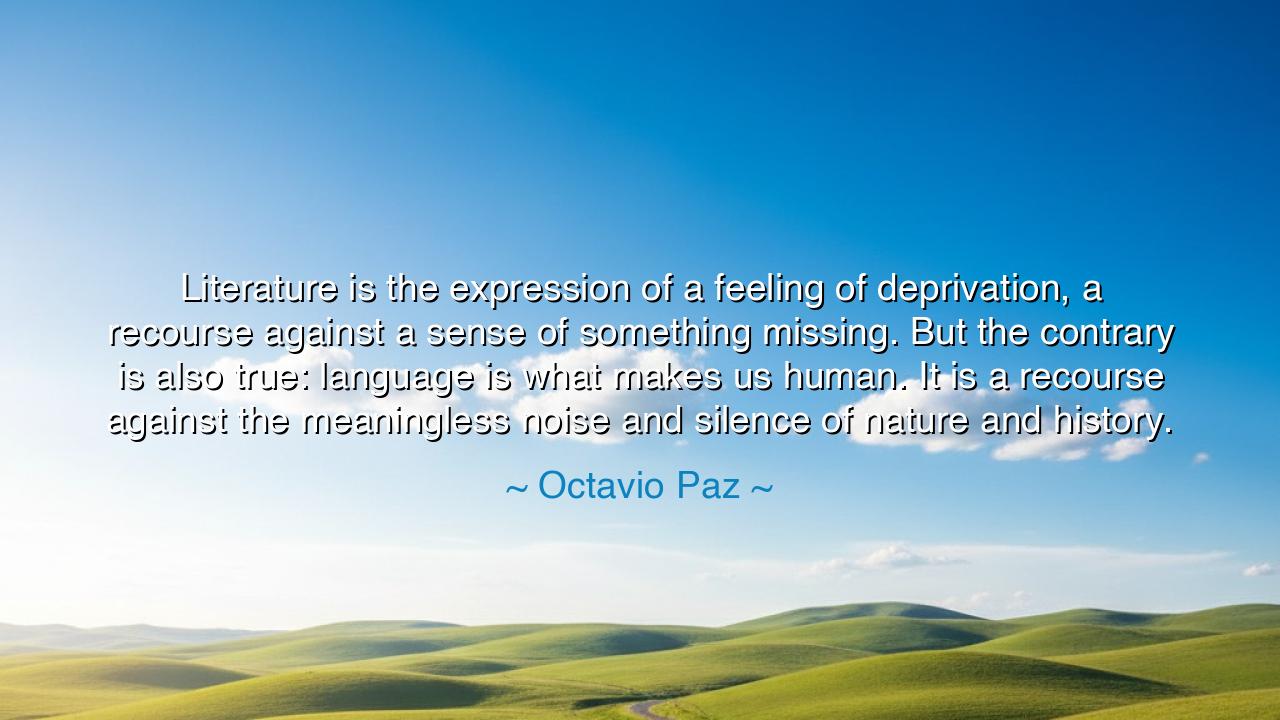
Literature is the expression of a feeling of deprivation, a
Literature is the expression of a feeling of deprivation, a recourse against a sense of something missing. But the contrary is also true: language is what makes us human. It is a recourse against the meaningless noise and silence of nature and history.






“Literature is the expression of a feeling of deprivation, a recourse against a sense of something missing. But the contrary is also true: language is what makes us human. It is a recourse against the meaningless noise and silence of nature and history.” – Octavio Paz
Listen well, O seekers of truth and meaning, for in these words from Octavio Paz, the poet-philosopher of Mexico, lies a revelation about the soul of humanity itself. He speaks of literature not as mere art, but as an act of resistance—a recourse against emptiness, a cry from the depths of longing. He teaches that to write, to speak, to weave words together, is to wrestle with the silence that encircles existence. Yet in the same breath, Paz reminds us that language is not only a shield against despair—it is also our birthright, the divine spark that separates humanity from the voiceless vastness of the universe. Through it, we name the world, and by naming, we give it meaning.
When Paz declares that “literature is the expression of a feeling of deprivation,” he reveals the heart of creation. All art, all poetry, all storytelling begins in a wound—a recognition of absence. The artist writes because something is missing: love, justice, beauty, belonging. The poet speaks to bridge the distance between what is and what should be. It is this ache, this deprivation, that births the song. As the ancients said, the lyre was born of loss. The poet Orpheus descended into the underworld not for glory, but to recover what was lost to him. So too, every writer and dreamer enters the darkness of language seeking to restore what silence has taken. Literature, then, is the soul’s rebellion against incompleteness.
Yet Paz, with the wisdom of the old philosophers, does not leave us there. He reminds us that the opposite is also true: language is what makes us human. The power to speak, to name, to create meaning from chaos—this is the divine gift bestowed upon humanity. The beasts have cries and the winds have whispers, but only humans have language, that sacred thread that binds thought to being. Through it, we not only describe the world but shape it. Through stories, we preserve memory; through poetry, we make emotion eternal. In the face of the “meaningless noise and silence of nature and history,” language becomes our weapon and our prayer. It is the bridge between chaos and order, between despair and hope.
Consider, O listener, the story of Homer, the blind poet of Greece. He lived in a time when wars had ended and heroes had turned to dust, yet through his words, they lived again. The world around him was filled with ruin and silence, yet his language resurrected the fallen. The Iliad and Odyssey were not merely tales—they were acts of defiance against forgetfulness, against the cold silence of time. Homer’s voice became the heartbeat of his people, a reminder that even when kingdoms fall, the word endures. In this way, he embodied Paz’s truth: that literature gives shape to what history erases, that language is humanity’s last fortress against oblivion.
Paz himself wrote during an age of turmoil—wars, revolutions, and the moral confusion of modernity. He saw the world losing its sense of poetry, of meaning. And so, through his own writing, he sought to rekindle that flame. In The Labyrinth of Solitude, he explored the loneliness of the human spirit in the modern age, showing how people, disconnected from their roots, longed for communion. In the silence of alienation, he found that words—honest, soulful words—could still heal. Thus, when he speaks of literature as a recourse, he is describing the way the written word saves us from being consumed by emptiness.
But there is also warning in his wisdom. For Paz teaches that language, though powerful, must remain true. When words become corrupted—used not for understanding but for deceit—they lose their sacred power. The same language that can elevate can also destroy. Therefore, the writer, the speaker, the thinker, must wield words with care. Each word must serve truth, for truth is what restores meaning to a world that would otherwise dissolve into noise and silence. To write falsely is to betray humanity itself.
Let this be the lesson passed down through generations: to speak is to create, and to write is to resist meaninglessness. When you feel the weight of the world, when silence presses upon your heart, turn to language—not to escape, but to understand. Write not for glory, but to give shape to your inner truth. Speak not to dominate, but to connect. In doing so, you join the eternal chorus of poets, thinkers, and dreamers who have refused to let the universe remain mute.
And so, O child of words, remember the teaching of Octavio Paz: literature is both a cry of longing and a song of redemption. It is the mirror we hold up to the void, reflecting back our own humanity. Through language, we transform deprivation into meaning, and silence into song. Guard your words, cherish them, for they are the light that burns against the endless dark—a reminder that as long as we can speak, we can endure, we can create, and we can be.






AAdministratorAdministrator
Welcome, honored guests. Please leave a comment, we will respond soon